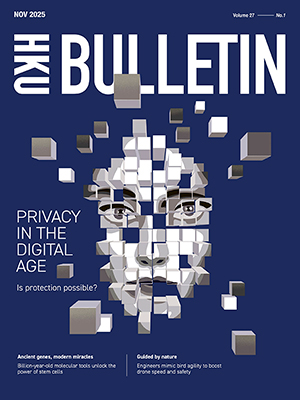May 2022 | Volume 23 No. 2
Cover Story
Material Values
The best things in life are free
But you can give them to the birds and bees
I need money (That’s what I want)
These lyrics come from an old American pop tune that has been covered by the Beatles and many other popular bands. But that fondness for material over emotional desires also fascinates psychologists, including Professor Chen Zhansheng, who has been studying the way money shapes how we think, feel and behave, as well as exploring cross-cultural differences.
“There is a long literature on materialism, which basically studies people’s values and how they think about money. Do you think money is the most important thing in life? How do you place money versus other things, for example your relationships and maybe your contributions to society?” he said.
Common sense might suggest that ranking money, or materialism, highly will negatively influence how one relates to others. Professor Chen’s research has been providing the hard evidence of causal effects, ruling out other factors, and trying to explain why this might be.
For instance, he has found that those high in materialism, as measured in questionnaires and experiments, tend to treat other people as instruments to facilitate goal achievement, such as networking for business connections. This makes them less able to empathise with others and follows on from other research that has found highly materialistic people can be more hostile and aggressive in the face of conflict.
Public health concern
Furthermore, people high in materialism also tend to unconsciously objectify themselves. “Such people are more likely to be very goal-oriented and spend a lot of effort and attention to sharpening their skills, staying motivated, and trying to create more wealth and gain more fame. In the meantime, they may lose touch or neglect qualities related to caring and compassion,” he said. “It may be that this will be problematic for public health. This is an area I want to pursue in future.”
He has already done related research showing the COVID-19 pandemic may be harder on highly materialistic people. The study, done in early 2020, was motivated by the fact people had to stay home and their chances to make money were diminished. “At that stage, people with higher materialism tended to experience a high level of stress and anxiety,” he said.
Another finding is that people with high materialism can also experience a small but significant effect on their expression of emotions. In one experiment, he had people read an article about the pros or cons of a money mindset. Those reading about the pros were subsequently more reserved about expressing emotions. “This is an implicit process and they are probably not aware of it – they may still internally feel these emotions, but they don’t want to show their emotions to minimise any potential impact on goal attainment.”
Professor Chen noted high materialism is not always bad as it can make people more efficient at work and enable them to gain more financially. It also does not strongly correlate to generosity or helpful behaviours as people may donate or volunteer for reasons unrelated to materialism, such as tax write-offs or to gain a favourable opinion from others.
“The relationship between materialism and helping behaviour is complicated, but the relationship with empathy is quite clear,” he said. “It shapes how you interact with others and also how you process information and treat yourself. It is not such a good thing to have this high materialistic value, especially for personal well-being.”
Cross-cultural comparisons
While materialism could be considered a personality trait, it can fluctuate or intensify depending on factors such as age and where a person lives. Professor Chen has ongoing studies on cross-cultural differences that show residents of urban financial centres like Hong Kong or economic powerhouses like the US and China tend to be more materialistic than residents in quiet rural areas, such as a village in Thailand. But comparisons of the US and China show they are more alike than different.
“In terms of empathy and pro-social behaviours, we have found that the patterns are similar. There are bigger differences within a country or culture than between them,” he said.
He points to the example of China, where people have been found in surveys to be among the most materialistic on Earth yet are strongly willing to support those closest to them without recompense.
“People are very generous to their close kin – their kids, their parents and close relatives. It seems like they create a protective nutshell around them that is not so influenced by materialism. But when dealing with others outside these close bonds, then they become very materialistic,” he said.
It shapes how you interact with others and also how you process information and treat yourself. It is not such a good thing to have this high materialistic value, especially for personal well-being.

PROFESSOR CHEN ZHANSHENG

